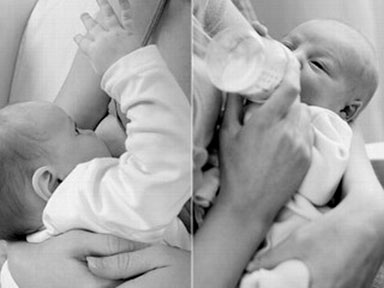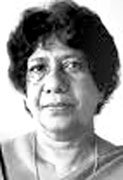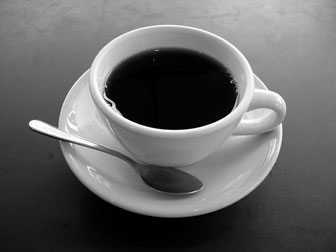|

Feeding your newborn
How you feed your newborn is the first nutrition decision you will
make for your child. Take a closer look at these guidelines for
breastfeeding and bottle-feeding so you can make an informed decision.
Breast or Bottle? The American Academy of Paediatrics (AAP) and other
professional groups concerned with the care of newborns advocate
breastfeeding as best for your baby.
Specifically, the AAP recommends that babies be breastfeed
exclusively for about the first 6 months. Following the introduction of
solid foods, breastfeeding should continue through the first year of
life and beyond, if desired.
 Breastfeeding
may not be possible or preferable for all women. Deciding to breastfeed
or bottle-feed a baby is usually based on the mother's comfort level
with breastfeeding as well as her lifestyle, but breastfeeding may not
be recommended for some mothers and babies. Breastfeeding
may not be possible or preferable for all women. Deciding to breastfeed
or bottle-feed a baby is usually based on the mother's comfort level
with breastfeeding as well as her lifestyle, but breastfeeding may not
be recommended for some mothers and babies.
If you have any questions about whether to breastfeed your child,
talk to your paediatrician.
Remember, your baby's nutritional and emotional needs will be met
whether you choose to breastfeed or formula-feed.
Breastfeeding Advantages
Breastfeeding your newborn has many advantages. Perhaps most
important, breast milk is the perfect food for a human baby's digestive
system. It contains the vitamins and minerals that a newborn requires,
and all of its components - lactose, protein (whey and casein), and fat
- are easily digested by a newborn's immature system. Commercial
formulas try to imitate breast milk, and come close, but the exact
composition cannot be duplicated.
Also, breast milk contains antibodies that help protect infants from
a wide variety of infectious diseases, including diarrhoea. Studies
suggest that breastfed babies are less likely to develop certain medical
problems, including diabetes, high cholesterol, asthma, and allergies.
Breastfeeding may also decrease the chances that the child will
become overweight or obese.Breastfeeding is great for moms, too. It
burns calories and helps shrink the uterus, so nursing moms get back
into shape quicker. Breastfeeding may also protect mom from breast and
ovarian cancer.
Some moms find breastfeeding easier and quicker than formula-feeding;
it needs no preparation, and you don't run out of breast milk in the
middle of the night. Also, breastfeeding costs little.
Nursing mothers do need to eat more and may want to buy nursing bras
and pads, a breast pump, or other equipment. But these expenses are
generally less than the cost of formula.
Breastfeeding meets a variety of emotional needs for both moms and
babies - the skin-to-skin contact can enhance the emotional connection,
and providing complete nourishment can help a new mother feel confident
in her ability to care for her newborn.
Formula-feeding Advantages
Commercially prepared infant formula is a nutritious alternative to
breast milk. Bottle-feeding can offer more freedom and flexibility for
the mother, and it makes it easier to know how much the baby is getting.
Because babies digest formula more slowly than breast milk, a baby
who is getting formula may need fewer feedings than one who breastfeeds.
Formula-feeding also can make it easier to feed the baby in public,
and allows the father and other family members to help feed the baby,
which can enhance bonding.
Limitations of Breastfeeding
With all the good things known about breastfeeding, why doesn't every
mother choose to breastfeed?
Breastfeeding requires a substantial commitment from a mother. Some
mothers feel tied down by the constant demands of a nursing newborn.
Since breast milk is easily digested, breastfed babies tend to eat
more often than babies who are fed formula. This means mom may find
herself in demand as frequently as every 2 or 3 hours in the first few
weeks. This can be tiring, but it's not long before babies feed less
frequently and sleep longer at night.
 Some
new mothers need to get back to work outside the home or separate from
their babies from time to time for other reasons. Some of these moms opt
for formula-feeding so other caregivers can give the baby a bottle.
Mothers who want to continue breastfeeding can use a breast pump to
collect breast milk to be given in a bottle so their babies still get
its benefits even when mom isn't available to breastfeed. Some
new mothers need to get back to work outside the home or separate from
their babies from time to time for other reasons. Some of these moms opt
for formula-feeding so other caregivers can give the baby a bottle.
Mothers who want to continue breastfeeding can use a breast pump to
collect breast milk to be given in a bottle so their babies still get
its benefits even when mom isn't available to breastfeed.
Other family members (dads most of all) may want to share in this
most fundamental of baby care routines and participate in feeding the
baby.
When mom is breastfeeding, dad or siblings may want to stay close by.
Helping mom get comfortable, or providing a burp cloth when needed,
will let them be part of the experience. Once breastfeeding is
established, other family members can help out by giving the baby pumped
breast milk in a bottle when mom needs a break.
Sometimes a woman may feel embarrassed or apprehensive about the
prospect of breastfeeding. These feelings usually disappear once a
successful breastfeeding process is set. It's often helpful to seek
advice and perspective from those who've gone through the experience.
Most hospitals and birthing centres can provide in-depth instruction
on breastfeeding techniques to new mothers. Your paediatrician, nurse
practitioner, or nurse can answer questions or put you in touch with a
lactation consultant or a breastfeeding support group.
In some cases, a mother's health may interfere with her ability to
breastfeed. For example, mothers undergoing chemotherapy for cancer and
moms who are infected with human immunodeficiency virus (HIV, the virus
that causes AIDS) should not breastfeed.
If you have a medical condition or take any medications regularly, or
if you or your baby get sick, talk to your doctor about whether it's
alright to breastfeed. If you have to stop nursing temporarily, it's
important to continue to pump breast milk to maintain milk production.
In some situations, it may not possible to breastfeed, such as when a
baby is sick or born prematurely. Mothers should speak to their baby's
doctor about expressing and storing milk. Even if the infant cannot
breastfeed, breast milk may be given via a feeding tube or bottle.
Sometimes mothers who have inverted nipples may have difficulty
breastfeeding, but with the help of a lactation consultant this usually
can be overcome. Likewise, women who have had plastic surgery on their
breasts should be able to successfully breastfeed. Be sure to speak to
your doctor if you have any concerns.
Avoid using pacifiers or bottles until after the first month of life.
Introducing them before breastfeeding is known to cause "nipple
confusion," and can lead to an infant giving up the breast.
Formula-feeding
Just as breastfeeding has its unique demands, so does bottle-feeding.
Bottle-feeding can require a great deal of organization and
preparation, especially if you want to take your baby out. Also, formula
costs can be considerable.
It's important to make sure that you have enough formula on hand, and
bottles that are clean and ready to be used. Here are a few key
guidelines for formula feeding:
Be sure to carefully follow directions on the label when preparing
formula.
Bottles left out of the refrigerator longer than one hour and any
formula left in the bottle that a baby doesn't finish should be
discarded.Prepared bottles of formula should be stored in the
refrigerator for no longer than 24 hours and should be carefully warmed
just before feeding.
A bottle of formula (or breast milk) should not be warmed in a
microwave. The bottle can heat unevenly and leave "hot spots" that can
burn a baby's mouth. Your newborn should be nursing eight to 12 times
per day during about the first month. In the beginning, mothers may want
to try nursing 10 to 15 minutes on each breast, then vary the time as
necessary.
Once your milk supply is established, breastfeeding should be "on
demand" (when your baby is hungry), which is generally every 1 to 3
hours.
As newborns get older, they'll need to nurse less frequently - some
may feed every hour and a half, whereas others may go 2 or 3 hours
between feedings. For babies who are getting formula, they'll likely
take about 2 to 3 ounces every 2 to 4 hours. Newborns should not go more
than about 4 hours without feeding.
Call your baby's doctor if you need to awaken your newborn frequently
or continually urge your baby to suck.
Most experts suggest you nurse or feed your baby whenever he or she
seems hungry. Signs that babies are hungry include: moving their heads
from side to side opening their mouths sticking out their tongues
placing their hands and fists to their mouths puckering their lips as if
to suck nuzzling again their mothers' breasts showing the rooting reflex
(when a baby moves its mouth in the direction of something that's
stroking or touching its cheek)
A rigid feeding schedule is not necessary; you and your baby will
eventually establish your unique feeding pattern. Babies know (and will
let their parents know) when they're hungry and when they've had enough.
Watch for signs that your baby is full (slow, uninterested sucking;
turning away from the breast or bottle) and stop the feeding once these
signs appear.
- KidsHealth.org
Make your home safe for your child
by Nilma Dole
Accidents are a dramatic cause of injury in children, said Dr.
Kalyani Guruge, the President of the College of Paeditricians and
Consultants at the General Hospital, Colombo and the Lady Ridgeway
Teaching Hospital. "Often people relate accidents to traffic and motor
accidents but a majority of accidents takes place at home. In fact,
there have been cases that have led to death," said the doctor.
 |
|
Dr. Kalyani Guruge |
Even though many think the home is a safe place, what they don't
realise is that the hazards that can cause a child. "The main cause of
accidents is general negligence of safety at home," she said.
Dr. Guruge added, "Poisoning is the fifth most common cause of fatal
injury in children around the world with the average child whose age is
less than 2 years can fall prey to household products and children over
2 years have the risk of consuming medicines that often look like sweets
to them.
The doctor also mentioned that they themselves do not determine what
hazards are there at home.
"In case of burns, mothers often start putting hot water in the
children's bath tub first and then add cold water which is dangerous to
a child," said Dr. Guruge. Another such hazard is leaving pots and pans
within easy reach of the child on a burning stove. Make sure you add
cold water before hot water and remember when you keep anything hot
unattended, warned the doctor.
Dr.Guruge highlighted that cords, wires or anything with a chain or
string attached should be kept away from the child.
"Certain high hazards in the lower class homes are kerosene burns
which attribute to many cases of child injury," said Dr.Guruge. She said
that those days in the middle and upper middle class houses, the only
poison they had was soap. "Of course, children never eat soap but
nowadays all products come in nice shapes and nice flavours so the child
is tempted.
In fact we had a case of a child swallowing banana face wash." In the
case of poisoning, Dr. Guruge said, "Do not ask the child to vomit if
you suspect a case of poisoning. Rush him/her immediately to the nearest
hospital or doctor." The doctor said that if any poison is brought up to
the throat, the chances of fatalities is more since the poison can
affect the windpipe.
Chemicals and all medicines should be kept away from children
including toys and little things which can make the child swallow it.
"Choking, foreign body inhalation and ingestion is also a common injury
when it comes to children" said Dr.Guruge.
According to world statistics, about 10 children die as a result of
falls every year - some from windows and balconies and the remainder
usually from stairs. "Make sure you keep the floors dry and children
going to the bathroom or kitchen should be supervised because accidents
are likely to occur in these places" said Dr.Guruge.
Redesign your home to make it safe for your child and be wary of the
signs of hazards. Accidents can't be completely avoided and children
should know about the dangers in the world but its occurrence could be
prevented.
To prevent accident to children, adults should pay more attention to
home safety. They should also clear any hidden "hazards" at home and
teach children about safety.
If accidents happen, stay calm and call for help immediately. "When
you go to the doctor, get ready with an explanation about everything the
child has done to which may have caused the injury, bring the drugs or
poison labels if they have ingested anything and make sure the child
also explains what they did to cause the injury" said Dr.Guruge who will
participate in the Medicare 2010 exhibition to be held at the BMICH in
March.
 |
 |
| Give children safe
toys |
Safety gate prevents
child fatalities |
Aitken Spence Exhibitions and Conventions will host the national
health exhibition with other medical professionals to focus on the local
health sector.
Prevention of burns:
1. For adults, never hold a hot drink/food and a child at the same
time
2. Ensure milk, cangee or other foodstuff is at a reasonable
temperature before feeding
3. Ensure proper fence or door is installed at the entrance of
kitchen. Such must be closed at all times. Instruct children not to go
into the kitchen
4. All hot objects including an iron or containers with hot matter
must not be placed near the margin of a table. Avoid using tablecloth.
Matches and lighters should be placed out of reach of children
5. Instruct children not to wander around when adults are preparing
for a meal
6. Install proper cover to sockets
7. Warn children never to play with fire.
Regular coffee consumption can reduce risk of prostate cancer
by Madeline Ellis
Leading up to the American Revolution in December 1773, the Boston
Tea Party was the historical event that began to transform America into
a coffee drinking nation. Today the U.S. is responsible for more than a
third of worldwide coffee consumption at 400 million cups every day.
Over the years, thousands of studies have been done examining
coffee's impact on health and, for the most part, their results are as
pleasing as the aroma of that freshly brewed cup of java.
"Overall, the research shows that coffee is far more healthful than
it is harmful," says Dr. Tomas DePaulis, research scientist at
Vanderbilt University's Institute for Coffee Studies. "For most people,
very little bad comes from drinking it, but a lot of good." Coffee not
only perks up energy and helps sharpen the mind, it has been shown to
lessen the severity of a heart attack or stroke and protect against
certain cancers, type 2 diabetes, liver disease and gallstones.
 There's
also evidence that coffee may help stop a headache, boost mood and even
prevent cavities. And a study presented this week at the Frontiers in
Cancer Prevention Research conference in Houston, Texas shows that men
who drink coffee on a regular basis have an added benefit-a
significantly decreased risk of developing aggressive prostate cancer. There's
also evidence that coffee may help stop a headache, boost mood and even
prevent cavities. And a study presented this week at the Frontiers in
Cancer Prevention Research conference in Houston, Texas shows that men
who drink coffee on a regular basis have an added benefit-a
significantly decreased risk of developing aggressive prostate cancer.
The study, by researchers from the Channing Laboratory at the Harvard
Medical School and the Harvard School of Public Health, was based on an
analysis of information from the Health Professionals' Follow-Up Study,
which included data on the coffee-drinking habits of about 50,000 men
from 1986 to 2006. During that time- frame, 4,975 of the men developed
prostate cancer, 846 cases being life-threatening because they had
spread beyond the prostate gland or were growing aggressively.
The review showed a clear relationship between the amount of coffee
consumed and prostate cancer risk. The men who drank the most coffee
(six or more cups per day) were nearly 60 percent less likely to develop
advanced prostate cancer and 19 percent less likely to develop any form
of prostate cancer than men who drank no coffee.
Some of coffee's reported benefits are a direct result of its high
caffeine content. An eight ounce cup of drip-brewed coffee contains
about 85 mg, which is about three and a half times more than the same
serving of tea or cola or one ounce of chocolate. But the researchers
say the fact that the same risk reduction was seen regardless of whether
the man drank regular or decaffeinated coffee suggests it isn't the
caffeine but rather coffee's influence on insulin and hormone levels
that caused the positive effect on prostate cancer risk.
"Coffee has effects on insulin and glucose metabolism, as well as sex
hormone levels, all of which play a role in prostate cancer," said lead
author Dr. Kathryn M. Wilson, a research fellow in epidemiology at the
Harvard School of Public Health.
Wilson said though more work is needed before any firm conclusion can
be drawn about the relationship between coffee and prostate cancer, the
results of this study are encouraging. "Very few lifestyle factors have
been consistently associated with prostate cancer risk, especially with
risk of aggressive disease, so it would be exciting if this association
is confirmed in other studies," Wilson said.
"While it is too early to recommend increasing coffee intake based on
this study alone, our results do suggest there is no reason to stop
drinking coffee out of any concern about prostate cancer."
Also presented at the conference was a study into the effects of
physical activity on prostate cancer survival by another Harvard School
of Public Health researcher, Stacey A. Kenfield.
It showed that prostate cancer patients who participated in vigorous
physical activity, such as jogging, biking, swimming or playing tennis,
for an average of three or more hours per week had a 35 percent lower
death rate than those who exercised less frequently or not at all. For
those who walked regularly (four or more hours per week), overall
mortality rates were 23 percent lower than men who walked for less than
20 minutes per week.
Kenfield says that while it's already known that physical activity
reduces overall mortality, this is the first study to focus on the
effect of exercise on prostate cancer survival.
-Healthnews
|

